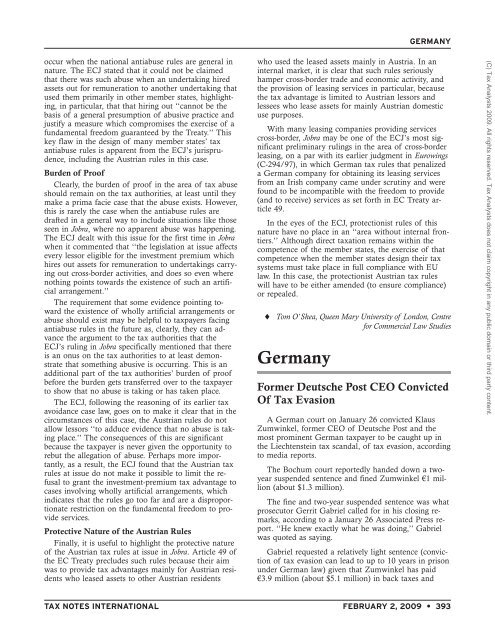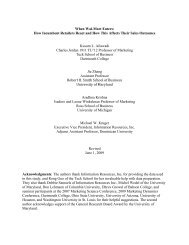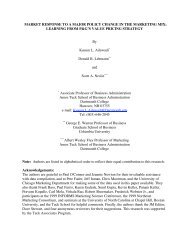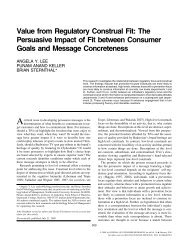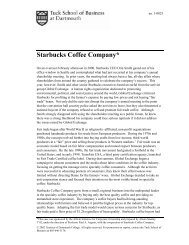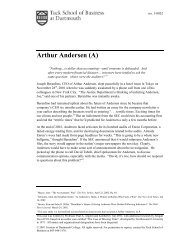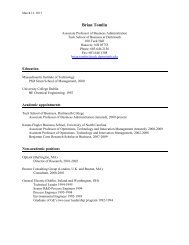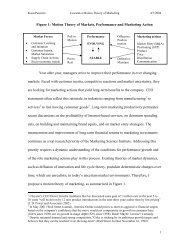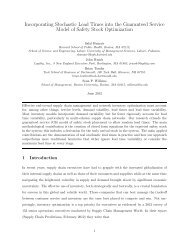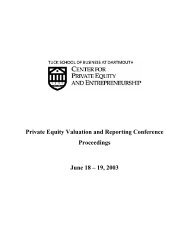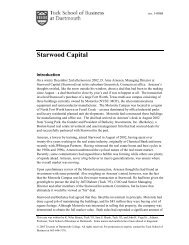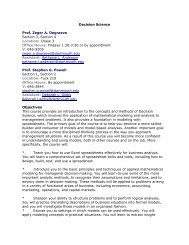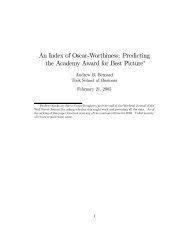tax notes international - Tuck School of Business - Dartmouth College
tax notes international - Tuck School of Business - Dartmouth College
tax notes international - Tuck School of Business - Dartmouth College
You also want an ePaper? Increase the reach of your titles
YUMPU automatically turns print PDFs into web optimized ePapers that Google loves.
occur when the national antiabuse rules are general in<br />
nature. The ECJ stated that it could not be claimed<br />
that there was such abuse when an undertaking hired<br />
assets out for remuneration to another undertaking that<br />
used them primarily in other member states, highlighting,<br />
in particular, that that hiring out ‘‘cannot be the<br />
basis <strong>of</strong> a general presumption <strong>of</strong> abusive practice and<br />
justify a measure which compromises the exercise <strong>of</strong> a<br />
fundamental freedom guaranteed by the Treaty.’’ This<br />
key flaw in the design <strong>of</strong> many member states’ <strong>tax</strong><br />
antiabuse rules is apparent from the ECJ’s jurisprudence,<br />
including the Austrian rules in this case.<br />
Burden <strong>of</strong> Pro<strong>of</strong><br />
Clearly, the burden <strong>of</strong> pro<strong>of</strong> in the area <strong>of</strong> <strong>tax</strong> abuse<br />
should remain on the <strong>tax</strong> authorities, at least until they<br />
make a prima facie case that the abuse exists. However,<br />
this is rarely the case when the antiabuse rules are<br />
drafted in a general way to include situations like those<br />
seen in Jobra, where no apparent abuse was happening.<br />
The ECJ dealt with this issue for the first time in Jobra<br />
when it commented that ‘‘the legislation at issue affects<br />
every lessor eligible for the investment premium which<br />
hires out assets for remuneration to undertakings carrying<br />
out cross-border activities, and does so even where<br />
nothing points towards the existence <strong>of</strong> such an artificial<br />
arrangement.’’<br />
The requirement that some evidence pointing toward<br />
the existence <strong>of</strong> wholly artificial arrangements or<br />
abuse should exist may be helpful to <strong>tax</strong>payers facing<br />
antiabuse rules in the future as, clearly, they can advance<br />
the argument to the <strong>tax</strong> authorities that the<br />
ECJ’s ruling in Jobra specifically mentioned that there<br />
is an onus on the <strong>tax</strong> authorities to at least demonstrate<br />
that something abusive is occurring. This is an<br />
additional part <strong>of</strong> the <strong>tax</strong> authorities’ burden <strong>of</strong> pro<strong>of</strong><br />
before the burden gets transferred over to the <strong>tax</strong>payer<br />
to show that no abuse is taking or has taken place.<br />
The ECJ, following the reasoning <strong>of</strong> its earlier <strong>tax</strong><br />
avoidance case law, goes on to make it clear that in the<br />
circumstances <strong>of</strong> this case, the Austrian rules do not<br />
allow lessors ‘‘to adduce evidence that no abuse is taking<br />
place.’’ The consequences <strong>of</strong> this are significant<br />
because the <strong>tax</strong>payer is never given the opportunity to<br />
rebut the allegation <strong>of</strong> abuse. Perhaps more importantly,<br />
as a result, the ECJ found that the Austrian <strong>tax</strong><br />
rules at issue do not make it possible to limit the refusal<br />
to grant the investment-premium <strong>tax</strong> advantage to<br />
cases involving wholly artificial arrangements, which<br />
indicates that the rules go too far and are a disproportionate<br />
restriction on the fundamental freedom to provide<br />
services.<br />
Protective Nature <strong>of</strong> the Austrian Rules<br />
Finally, it is useful to highlight the protective nature<br />
<strong>of</strong> the Austrian <strong>tax</strong> rules at issue in Jobra. Article 49 <strong>of</strong><br />
the EC Treaty precludes such rules because their aim<br />
was to provide <strong>tax</strong> advantages mainly for Austrian residents<br />
who leased assets to other Austrian residents<br />
who used the leased assets mainly in Austria. In an<br />
internal market, it is clear that such rules seriously<br />
hamper cross-border trade and economic activity, and<br />
the provision <strong>of</strong> leasing services in particular, because<br />
the <strong>tax</strong> advantage is limited to Austrian lessors and<br />
lessees who lease assets for mainly Austrian domestic<br />
use purposes.<br />
With many leasing companies providing services<br />
cross-border, Jobra may be one <strong>of</strong> the ECJ’s most significant<br />
preliminary rulings in the area <strong>of</strong> cross-border<br />
leasing, on a par with its earlier judgment in Eurowings<br />
(C-294/97), in which German <strong>tax</strong> rules that penalized<br />
a German company for obtaining its leasing services<br />
from an Irish company came under scrutiny and were<br />
found to be incompatible with the freedom to provide<br />
(and to receive) services as set forth in EC Treaty article<br />
49.<br />
In the eyes <strong>of</strong> the ECJ, protectionist rules <strong>of</strong> this<br />
nature have no place in an ‘‘area without internal frontiers.’’<br />
Although direct <strong>tax</strong>ation remains within the<br />
competence <strong>of</strong> the member states, the exercise <strong>of</strong> that<br />
competence when the member states design their <strong>tax</strong><br />
systems must take place in full compliance with EU<br />
law. In this case, the protectionist Austrian <strong>tax</strong> rules<br />
will have to be either amended (to ensure compliance)<br />
or repealed.<br />
♦ Tom O’Shea, Queen Mary University <strong>of</strong> London, Centre<br />
for Commercial Law Studies<br />
Germany<br />
GERMANY<br />
Former Deutsche Post CEO Convicted<br />
Of Tax Evasion<br />
A German court on January 26 convicted Klaus<br />
Zumwinkel, former CEO <strong>of</strong> Deutsche Post and the<br />
most prominent German <strong>tax</strong>payer to be caught up in<br />
the Liechtenstein <strong>tax</strong> scandal, <strong>of</strong> <strong>tax</strong> evasion, according<br />
to media reports.<br />
The Bochum court reportedly handed down a twoyear<br />
suspended sentence and fined Zumwinkel €1 million<br />
(about $1.3 million).<br />
The fine and two-year suspended sentence was what<br />
prosecutor Gerrit Gabriel called for in his closing remarks,<br />
according to a January 26 Associated Press report.<br />
‘‘He knew exactly what he was doing,’’ Gabriel<br />
was quoted as saying.<br />
Gabriel requested a relatively light sentence (conviction<br />
<strong>of</strong> <strong>tax</strong> evasion can lead to up to 10 years in prison<br />
under German law) given that Zumwinkel has paid<br />
€3.9 million (about $5.1 million) in back <strong>tax</strong>es and<br />
TAX NOTES INTERNATIONAL FEBRUARY 2, 2009 • 393<br />
(C) Tax Analysts 2009. All rights reserved. Tax Analysts does not claim copyright in any public domain or third party content.


